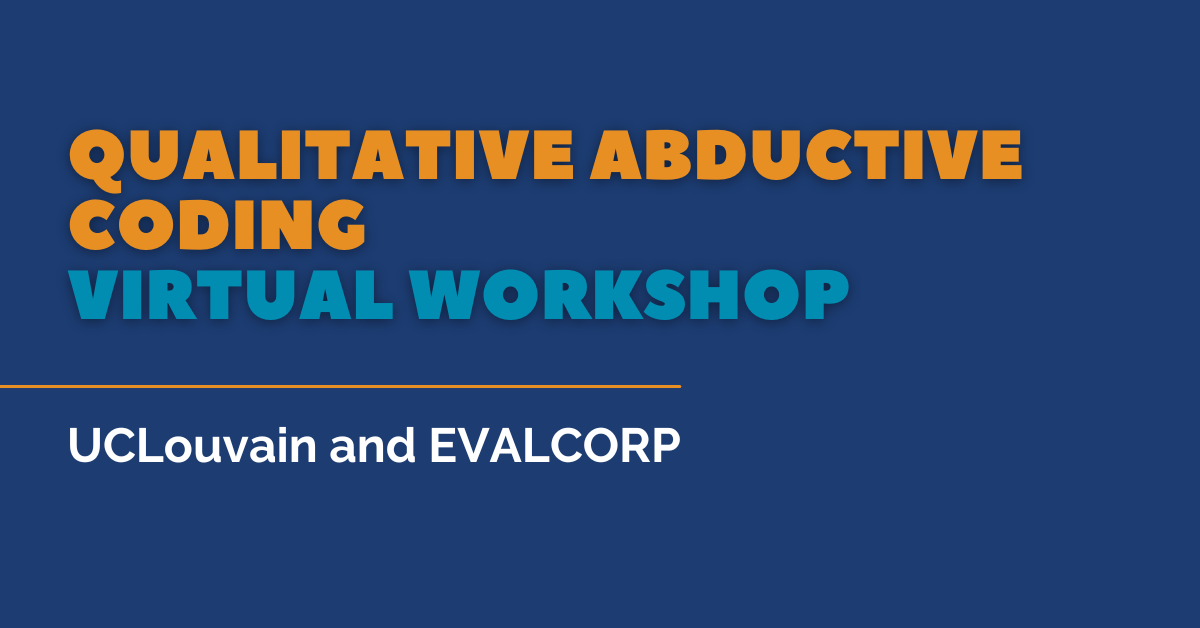On November 21, 2024, EVALCORP had the honor of hosting an International Abductive Coding Workshop, offering a deep dive into qualitative coding and abductive analysis. This virtual event provided a unique opportunity for researchers, educators, and applied practitioners from around the world to explore valuable tools and strategies grounded in the innovative techniques presented in the widely cited article written by our very own Dr. Vila-Henninger “Abductive Coding: Theory Building and Qualitative (Re)Analysis” (Vila-Henninger, Dupuy, Van Ingelgom et al., 2022).
Whether attendees were new to abductive analysis or seasoned in qualitative coding, the workshop catered to diverse skill levels, fostering both learning and collaboration.
Key Workshop Themes
The workshop was structured around the core methodologies introduced in the article, emphasizing:
- Qualitative coding techniques.
- Abductive analysis as a powerful tool for theory building and reanalysis.
- Practical applications for academic research, teaching, and applied research projects.
By focusing on these themes, participants gained actionable insights to enhance their qualitative research practices.
Spotlight on Our Facilitators
We were thrilled to welcome esteemed facilitators from the political science department at UCLouvain in Belgium—Professors Virginie Van Ingelgom and Claire Dupuy, who presented alongside our own Dr. Luis Vila-Henninger. Their expertise brought depth and authenticity to the sessions.
- Virginie Van Ingelgom: A Senior Research Associate Professor at UCLouvain, Virginie specializes in exploring democracy, legitimacy, and citizens’ attitudes across various governance levels. Her methodological expertise spans qualitative and mixed methods, making her a perfect fit for co-leading this workshop.
- Claire Dupuy: As a Professor of Comparative Politics at UCLouvain, Claire’s research interest focuses on multilevel governance, federalism and regionalization processes in Western Europe as well as on policy feedback on democracy. Her methodological expertise in methods, mostly qualitative secondary analysis, big qual, small N case studies and theorization and comparative research designs enriched her co-leadership of this workshop.
- Dr. Luis Vila-Henninger: As a Research Associate I at EVALCORP, Luis specializes in qualitative methods and abductive analysis. Luis has research experience in criminology, deviance, drug and alcohol use, education, public health, qualitative methods, and decision-making.
Both Virginie and Claire have received a Proof-of-Concept grant from the European Research Council, supporting their efforts to expand the applied uses of abductive coding. Alongside co-author Luis, they brought the article’s theoretical framework to life, showcasing its relevance across various research contexts.
Workshop Highlights
There were two workshop sessions: one for a general audience and one for stakeholders. Several standout moments made both sessions of this workshop a resounding success:
- High Turnout and Engagement: Both sessions attracted a large, enthusiastic international audience. Participants brought insightful questions and actively engaged in discussions, creating a collaborative learning environment.
- Impactful Feedback: The feedback collected during and after the workshop is already shaping future resources. The primary goal of the Proof-of-Concept grant is to develop a concise handbook based on the article’s techniques. Participant feedback from these sessions has been instrumental in advancing this initiative.
- Seamless Collaboration: The workshop was made possible through the collaborative efforts of the EVALCORP team, who not only hosted the event but also contributed to its success by actively participating. Our team’s support ensured a warm welcome for Virginie and Claire, highlighting the spirit of partnership and shared learning.
Looking Ahead
The Abductive Coding Workshop was more than just a learning opportunity—it was a space for international connection and innovation. The techniques explored promise to empower researchers across disciplines to approach qualitative data with fresh perspectives. We are proud to have played a role in advancing this important methodological work and look forward to seeing how the knowledge shared in this workshop will influence future projects. The workshop will culminate in a report that applies the feedback from the workshop to begin to advance the toolkit.

